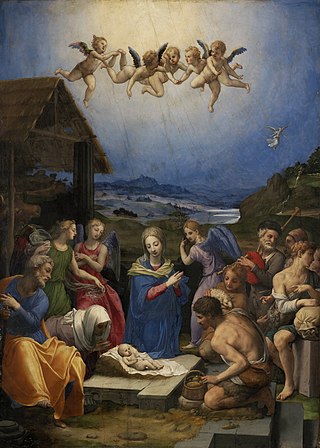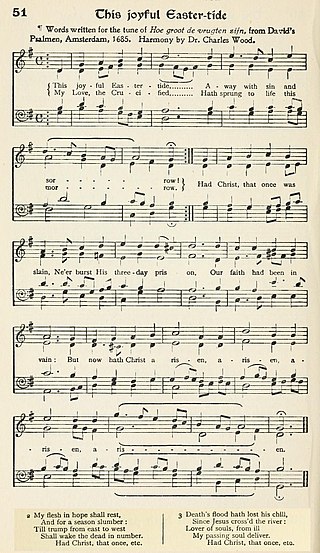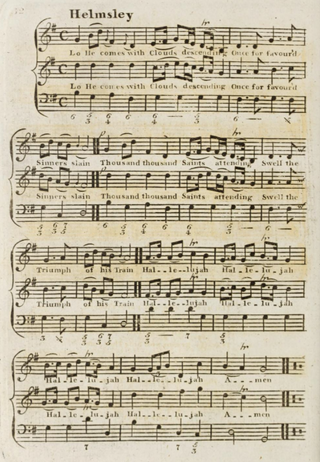Related Research Articles

A hymn is a type of song, and partially synonymous with devotional song, specifically written for the purpose of adoration or prayer, and typically addressed to a deity or deities, or to a prominent figure or personification. The word hymn derives from Greek ὕμνος (hymnos), which means "a song of praise". A writer of hymns is known as a hymnist. The singing or composition of hymns is called hymnody. Collections of hymns are known as hymnals or hymn books. Hymns may or may not include instrumental accompaniment. Polyhymnia is the Greco/Roman goddess of hymns.
A doxology is a short hymn of praises to God in various forms of Christian worship, often added to the end of canticles, psalms, and hymns. The tradition derives from a similar practice in the Jewish synagogue, where some version of the Kaddish serves to terminate each section of the service.

A hymnal or hymnary is a collection of hymns, usually in the form of a book, called a hymnbook. They are used in congregational singing. A hymnal may contain only hymn texts ; written melodies are extra, and more recently harmony parts have also been provided.
"Joy to the World" is an English Christmas carol. It was written in 1719 by the English minister and hymnist Isaac Watts. The carol is usually sung to the American composer Lowell Mason's 1848 arrangement of a tune attributed to George Frideric Handel. The carol's lyrics are a Christian reinterpretation of Psalm 98 and Genesis 3.

"Hark! The Herald Angels Sing" is an English Christmas carol that first appeared in 1739 in the collection Hymns and Sacred Poems. The carol, based on Luke 2:14, tells of an angelic chorus singing praises to God. As it is known in the modern era, it features lyrical contributions from Charles Wesley and George Whitefield, two of the founding ministers of Methodism, with music adapted from "Vaterland, in deinen Gauen" of Felix Mendelssohn's cantata Festgesang.

"Rock of Ages" is a popular Christian hymn written by the Reformed Anglican minister Augustus Toplady.
Decisions concerning the conduct of public worship in the Church of Scotland are entirely at the discretion of the parish minister. As a result, a wide variety of musical resources are used. However, at various times in its history, the General Assembly has commissioned volumes of psalms and hymns for use by congregations.
"I'll Fly Away" is a hymn written in 1929 by Albert E. Brumley and published in 1932 by the Hartford Music company in a collection titled Wonderful Message. Brumley's writing was influenced by the 1924 secular ballad, "The Prisoner's Song".
Phos Hilaron is an ancient Christian hymn originally written in Koine Greek. Often referred to in the Western Church by its Latin title Lumen Hilare, it has been translated into English as O Gladsome Light. It is one of the earliest known Christian hymns recorded outside of the Bible that is still in use today. The hymn is part of vespers in the Eastern Orthodox Church and the Byzantine Rite of the Catholic Church, and also included in some Anglican liturgies and Lutheran hymnals.
Picardy is a hymn tune used in Christian churches, based on a French carol; it is in a minor key and its meter is 8.7.8.7.8.7. Its name comes from the province of France from where it is thought to originate. The tune dates back at least to the 17th century, and was originally used for the folk song "Jésus-Christ s'habille en pauvre". First published in the 1848 collection Chansons populaires des provinces de France, "Picardy" was most famously arranged by Ralph Vaughan Williams in 1906 for the hymn "Let All Mortal Flesh Keep Silence", in the English Hymnal, the words of which are taken from the Byzantine Greek Liturgy of St. James translated by Gerard Moultrie, a chaplain at Shrewsbury School.

"Thine Be the Glory, Risen Conquering Son", also titled "Thine Is the Glory", is a Christian hymn for Easter, written by the Swiss Protestant minister, Edmond Budry (1854–1932), and set to the tune of the chorus "See, the Conqu'ring hero comes" from the third section of Handel's oratorio Judas Maccabaeus. The hymn is sometimes sung at weddings or funerals.
"One Morning in May" is an English folk song which has been collected from traditional singers in England and the USA and has also been recorded by revival singers. Through the use of double-entendre, at least in the English versions, it tells of an encounter between a grenadier and a lady.

"All Glory, Laud and Honour" is an English translation by the Anglican clergyman John Mason Neale of the Latin hymn "Gloria, laus et honor", which was written by Theodulf of Orléans in 820. It is a Palm Sunday hymn, based on Matthew 21:1–11 and the occasion of Christ's triumphal entry into Jerusalem.

"Praise, my soul, the King of heaven" is a Christian hymn. Its text, which draws from Psalm 103, was written by Anglican divine Henry Francis Lyte. First published in 1834, it endures in modern hymnals to a setting written by John Goss in 1868, and remains one of the most popular hymns in English-speaking denominations.

"O'er the Gloomy Hills of Darkness", also titled "O'er Those Gloomy Hills of Darkness", is a Welsh Christian hymn by William Williams Pantycelyn written in 1772. The hymn was written as a missionary hymn; there are conflicting accounts of why the hymn was written. The hymn was later published in 374 hymnals worldwide, though it was censored and altered in the United States by slaveholders for evangelising to slaves. The hymn later fell out of favour with hymn book editors in the 1960s.

"This joyful Eastertide" is an 1894 Easter carol. The words are by George Ratcliffe Woodward, the tune is from the Netherlands (1624), and the 1894 harmonisation is by Charles Wood.

"Die güldne Sonne voll Freud und Wonne" is a Lutheran hymn by Paul Gerhardt. It is a morning hymn which was first published in 1666, with a four-part setting by Johann Georg Ebeling. Gerhardt created an unusual hymn metre for its 12 stanzas.

"Lo! He comes with clouds descending" is a Christian hymn by Charles Wesley (1707–1788), based on an earlier hymn, "Lo! He cometh, countless Trumpets" by John Cennick (1718–1755). Most commonly sung at Advent, the hymn derives its theological content from the Book of Revelation relating imagery of the Day of Judgment. Considered one of the "Great Four Anglican Hymns" in the 19th century, it is most commonly sung to the tune Helmsley, first published in 1763.
Vox clara ecce intonat is a Latin hymn used traditionally in the Liturgy of the Hours at Lauds during Advent. An alternative version of the same hymn begins "En clara vox redarguit."
References
- ↑ "A Collection of Psalms and Hymns Suited to the Various Occasions of Public Worship d113. Hark, from the tomb [tombs] a doleful [warning][mournful] sound | Hymnary.org". hymnary.org. Retrieved 2024-08-04.
- ↑ Life of the Rev. Elisha W. Green, one of the founders of the Kentucky normal and theological institute... Maysville, Ky.: The Republican printing office. 1888. p. 3. hdl:2027/loc.ark:/13960/t2w37tf1b . Retrieved 2024-07-12– via HathiTrust.
- ↑ "Hark from the tomb the doleful sound". Library of Congress, Washington, D.C. 20540 USA. 22 November 1936. Retrieved 2024-08-04.
- ↑ "Wolf Folklore Collection: Hark From the Tomb". home.lyon.edu. Retrieved 2024-08-04.
- ↑ "Hark, from the tomb; Hark, from the tomb a doleful sound". Umbra Search African American History. Retrieved 2024-08-04.
- ↑ Atherton, James S. (1967). "To Give down the Banks and Hark from the Tomb!". James Joyce Quarterly. 4 (2): 75–83. ISSN 0021-4183. JSTOR 25486618.